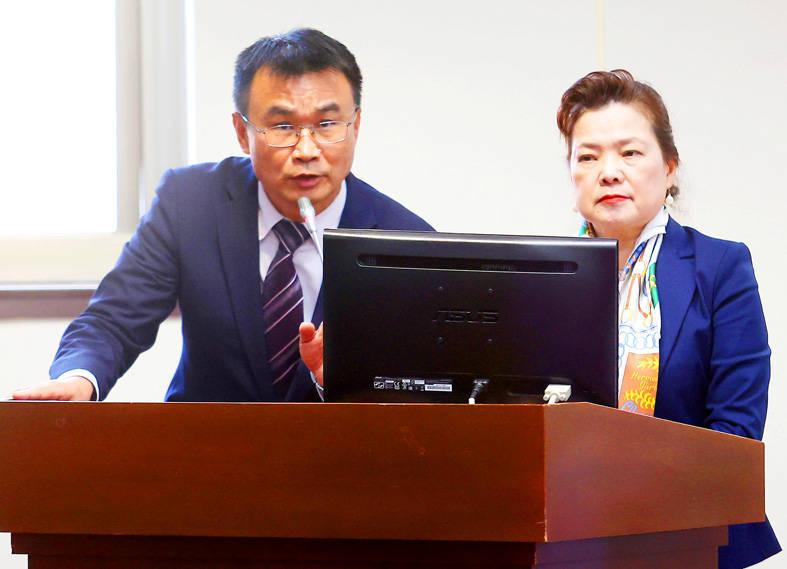《TAIPEI TIMES》Farmgate egg prices not to rise: COA

Council of Agriculture Minister Chen Chi-chung, left, and Minister of Economic Affairs Wang Mei-hua attend a news conference at the Legislative Yuan in Taipei yesterday. Photo: CNA
ENSURING EGG SUPPLY: The council said egg production is expected to increase this month as temperatures rise and younger egg-laying hens replaces older ones
By Shelley Shan / Staff reporter
Farmgate egg prices in Taiwan would not surge dramatically due to slightly more expensive eggs imported from Australia, the Council of Agriculture (COA) said yesterday, adding that the government would cover the price difference between imported eggs and locally produced eggs.
The first batch of 360,000 Australian eggs arrived on Friday last week via air as part of the council’s measures to address a nationwide egg shortage. Each imported egg costs NT$12, which is NT$6 more than a locally produced egg.
Council data showed that the nation has a shortfall of 500,000 to 800,000 eggs per day.
“Taiwan’s egg supply decreased after the Lunar New Year holiday due to an avian flu outbreak, cold waves and the replacement of old hens at chicken farms,” Council of Agriculture Minister Chen Chi-chung (陳吉仲) told reporters on the sidelines of a meeting of the legislature’s Economics Committee.
“Egg production is expected to rise this month, as the weather is to become warmer and risks of another avian flu outbreak are under control,” Chen said, adding that chicken farms are expected to resume egg production after they have replaced old hens with young ones.
To meet consumer demands in the short term, eggs imported from Australia are to be used by processed food manufacturers, who in turn would release eggs in their inventories to the local market, Chen said.
Five million Australian eggs are to arrive by the end of this month, he said.
Asked why the council did not import cheaper eggs from Japan as it did last year, Chen said that Japan also needs to import eggs from other countries after culling nearly 17 million chickens because of avian flu.
Costs of imported eggs vary, depending on whether they are delivered by air or sea, Chen said.
“The council would pay for the difference between the retail prices of local eggs and imported eggs. This will not affect the farmgate prices of eggs in Taiwan,” Chen said.
“Our main task is to ensure that eggs are available for purchase,” he said.
Chen told Chinese National Party (KMT) Legislator Tseng Ming-chung (曾銘宗) that the funding to pay for price difference would come from the Fund for Redressing Damage to Farmers by Agricultural Imports (農產品受進口損害救助基金).
With warm weather, imported eggs and an increasing local egg supply, the council aims to meet most the of the egg demand by the end of this month, Chen said.
However, it would take another two to three months to raise the egg supply from 2.24 million per day to 2.4 million per day, he added.
Tomorrow, the council would announce a plan to raise the nation’s self-sufficiency rate for eggs in the long run, Chen said.
“Imported eggs cost more than locally produced eggs, and must meet our criteria for animal health and quarantine. In the long term, we must strive to have a self-sufficiency rate of 100 percent in egg supply,” Chen said.
“We are proposing to allocate approximately NT$1.8 billion [US$58.85 million] to upgrade facilities at chicken farms nationwide so that they can withstand challenges brought by climate change and have stable egg production.”
新聞來源:TAIPEI TIMES













